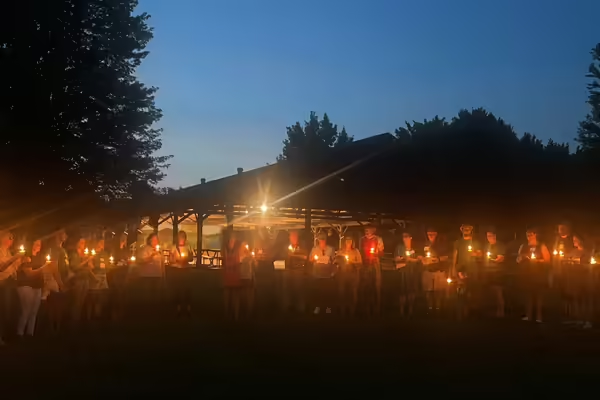
MONTICELLO, Ill. — On Saturday, July 19, alumni, families, supporters, and current and former staff gathered on the grounds of 4-H Memorial Camp, which is located within Allerton Park but independently owned and operated by Illinois 4-H, to commemorate the camp’s 75th anniversary. Since opening its doors in 1950, 4-H Memorial Camp has shaped the lives of thousands of youth through hands-on learning and connection to the natural world.
Hosted by University of Illinois Extension 4-H, the celebration honored the rich legacy of one of Illinois’ most cherished youth development landmarks and cast a hopeful eye toward the future. The evening featured remarks, videos, song, laughter, and a heartfelt candlelight ceremony beneath the stars.
“4-H Memorial Camp is more than a place, it’s a legacy,” said camp director Andy Davis. “It’s humbling to look around and see the generations of campers, counselors, and leaders whose lives have been shaped by their time here. This celebration is for them and for the next 75 years of memories still to come.”
The evening program was emceed by Illinois Public Media’s Todd Gleason and opened with a welcome and historical reflection, noting the original 1950 dedication that took place just outside the dining hall. A commemorative video set the tone, highlighting camp memories spanning generations.
Guests heard from special speakers including Dr. Kevin Carey, interim assistant dean for 4-H youth development, who emphasized camp’s lasting impact on youth confidence and leadership.
“As we celebrate the past, we also recognize the responsibility we share in shaping the future,” Carey said. “Camp has been a cornerstone of the 4-H experience in Illinois, and together, we will ensure it continues to thrive for generations to come.”
One of the evening’s most anticipated moments was the panel of past camp directors. Norma Turok, David Shiley, Curt Sinclair, and Andy Davis shared personal stories, camp traditions, and reflections on the camp’s evolution through the decades. From tales of lifelong friendships to advice for future youth leaders, the panel reinforced the deep personal and professional impact of the 4-H camp experience.
The celebration also included testimonials from former staff, including David Fulton and Jillian Baker. Both credited 4-H and their years on camp staff for building skills that shaped their careers and personal development. Baker, who now works with National 4-H Council, shared how camp sparked her commitment to youth leadership and service.
In a special “Camp Generations” activity, attendees stood by decade to reflect on their first summer at camp, offering a powerful visual of camp’s multi-generational reach. Guests from the 1950s through the 2020s rose to share in the celebration, underscoring the camp’s enduring spirit.
The program also unveiled a forward-looking vision for camp improvements. Angie Barnard, executive director of the Illinois 4-H Foundation, and Maggie Wave, associate dean of advancement for the College of ACES, introduced future plans for year-round accessibility, upgrades to Iwig Lodge, and modernized restrooms. The announcement included the naming of a lead gift donor, Bea Bagby, who pledged $50,000 to support future renovations.
“Tonight is about dreaming big,” said Barnard. “We invite everyone who has been touched by this place to help us write the next chapter of the 4-H Memorial Camp story.”
The evening concluded outdoors with a flag-lowering ceremony and a moving candlelight tribute. Five candles were lit by current and former staff, symbolizing the camp’s founding, its alumni, its traditions, its growth, and its future. Attendees joined in the traditional singing of “Linger” before gathering for s’mores around the fire.
A commemorative tree was planted earlier that day, marking a lasting symbol of the legacy rooted in the camp’s mission.
Founded in 1950 on land donated by philanthropist Robert Allerton in memory of Illinois soldiers who lost their lives in World War II, 4-H Memorial Camp has welcomed more than 250,000 youth and adults. As part of University of Illinois Extension and Illinois 4-H, the camp continues to foster belonging, leadership, and discovery—honoring the past while inspiring the future.
For more information, visit the 4-H Memorial Camp 75th Anniversary Page.
About Illinois 4-H:
Illinois 4-H is the flagship youth development program of University of Illinois Extension, administered through the College of Agricultural, Consumer and Environmental Sciences. Through hands-on learning and life-changing experiences, Illinois 4-H prepares youth to be Beyond Ready — ready for college, career, military service, entrepreneurship, and more. Young people build confidence, leadership, and resilience as they explore interests from agriculture to computer science. Independent research and national surveys confirm the powerful outcomes of 4-H: participants are 40% more likely to pursue a college degree, twice as likely to obtain technical training, and two times more likely to serve in the military. With a legacy of cultivating leaders, Illinois 4-H continues to grow the next generation who are equipped to thrive in life and work today and beyond.
Writer: Carissa Nelson, 4-H Media Communications Manager, carissa7@illinois.edu
University of Illinois Extension develops educational programs, extends knowledge, and builds partnerships to support people, communities, and their environments as part of the state's land-grant institution. Extension serves as the leading public outreach effort for University of Illinois Urbana-Champaign and the College of Agricultural, Consumer and Environmental Sciences in all 102 Illinois counties through a network of 27 multi-county units and over 700 staff statewide. Extension’s mission is responsive to eight strategic priorities — community, economy, environment, food and agriculture, health, partnerships, technology and discovery, and workforce excellence — that are served through six program areas — 4-H youth development, agriculture and agribusiness, community and economic development, family and consumer science, integrated health disparities, and natural resources, environment, and energy.